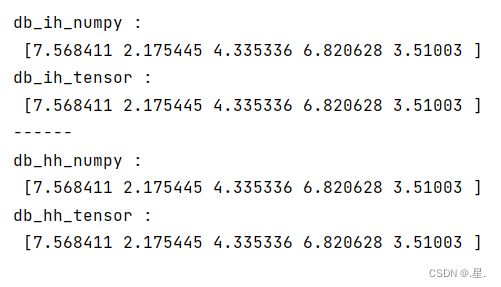NNDL 作业9:分别使用numpy和pytorch实现BPTT
目录
6-1P:推导RNN反向传播算法BPTT.
6-2P:设计简单RNN模型,分别用Numpy、Pytorch实现反向传播算子,并代入数值测试.
总结
6-1P:推导RNN反向传播算法BPTT.
6-2P:设计简单RNN模型,分别用Numpy、Pytorch实现反向传播算子,并代入数值测试.
import torch
import numpy as np
class RNNCell:
def __init__(self, weight_ih, weight_hh,
bias_ih, bias_hh):
self.weight_ih = weight_ih
self.weight_hh = weight_hh
self.bias_ih = bias_ih
self.bias_hh = bias_hh
self.x_stack = []
self.dx_list = []
self.dw_ih_stack = []
self.dw_hh_stack = []
self.db_ih_stack = []
self.db_hh_stack = []
self.prev_hidden_stack = []
self.next_hidden_stack = []
# temporary cache
self.prev_dh = None
def __call__(self, x, prev_hidden):
self.x_stack.append(x)
next_h = np.tanh(
np.dot(x, self.weight_ih.T)
+ np.dot(prev_hidden, self.weight_hh.T)
+ self.bias_ih + self.bias_hh)
self.prev_hidden_stack.append(prev_hidden)
self.next_hidden_stack.append(next_h)
# clean cache
self.prev_dh = np.zeros(next_h.shape)
return next_h
def backward(self, dh):
x = self.x_stack.pop()
prev_hidden = self.prev_hidden_stack.pop()
next_hidden = self.next_hidden_stack.pop()
d_tanh = (dh + self.prev_dh) * (1 - next_hidden ** 2)
self.prev_dh = np.dot(d_tanh, self.weight_hh)
dx = np.dot(d_tanh, self.weight_ih)
self.dx_list.insert(0, dx)
dw_ih = np.dot(d_tanh.T, x)
self.dw_ih_stack.append(dw_ih)
dw_hh = np.dot(d_tanh.T, prev_hidden)
self.dw_hh_stack.append(dw_hh)
self.db_ih_stack.append(d_tanh)
self.db_hh_stack.append(d_tanh)
return self.dx_list
if __name__ == '__main__':
np.random.seed(123)
torch.random.manual_seed(123)
np.set_printoptions(precision=6, suppress=True)
rnn_PyTorch = torch.nn.RNN(4, 5).double()
rnn_numpy = RNNCell(rnn_PyTorch.all_weights[0][0].data.numpy(),
rnn_PyTorch.all_weights[0][1].data.numpy(),
rnn_PyTorch.all_weights[0][2].data.numpy(),
rnn_PyTorch.all_weights[0][3].data.numpy())
nums = 3
x3_numpy = np.random.random((nums, 3, 4))
x3_tensor = torch.tensor(x3_numpy, requires_grad=True)
h3_numpy = np.random.random((1, 3, 5))
h3_tensor = torch.tensor(h3_numpy, requires_grad=True)
dh_numpy = np.random.random((nums, 3, 5))
dh_tensor = torch.tensor(dh_numpy, requires_grad=True)
h3_tensor = rnn_PyTorch(x3_tensor, h3_tensor)
h_numpy_list = []
h_numpy = h3_numpy[0]
for i in range(nums):
h_numpy = rnn_numpy(x3_numpy[i], h_numpy)
h_numpy_list.append(h_numpy)
h3_tensor[0].backward(dh_tensor)
for i in reversed(range(nums)):
rnn_numpy.backward(dh_numpy[i])
print("numpy_hidden :\n", np.array(h_numpy_list))
print("tensor_hidden :\n", h3_tensor[0].data.numpy())
print("------")
print("dx_numpy :\n", np.array(rnn_numpy.dx_list))
print("dx_tensor :\n", x3_tensor.grad.data.numpy())
print("------")
print("dw_ih_numpy :\n",
np.sum(rnn_numpy.dw_ih_stack, axis=0))
print("dw_ih_tensor :\n",
rnn_PyTorch.all_weights[0][0].grad.data.numpy())
print("------")
print("dw_hh_numpy :\n",
np.sum(rnn_numpy.dw_hh_stack, axis=0))
print("dw_hh_tensor :\n",
rnn_PyTorch.all_weights[0][1].grad.data.numpy())
print("------")
print("db_ih_numpy :\n",
np.sum(rnn_numpy.db_ih_stack, axis=(0, 1)))
print("db_ih_tensor :\n",
rnn_PyTorch.all_weights[0][2].grad.data.numpy())
print("------")
print("db_hh_numpy :\n",
np.sum(rnn_numpy.db_hh_stack, axis=(0, 1)))
print("db_hh_tensor :\n",
rnn_PyTorch.all_weights[0][3].grad.data.numpy())
"""
代码输出
numpy_hidden :
[[[ 0.4686 -0.298203 0.741399 -0.446474 0.019391]
[ 0.365172 -0.361254 0.426838 -0.448951 0.331553]
[ 0.589187 -0.188248 0.684941 -0.45859 0.190099]]
[[ 0.146213 -0.306517 0.297109 0.370957 -0.040084]
[-0.009201 -0.365735 0.333659 0.486789 0.061897]
[ 0.030064 -0.282985 0.42643 0.025871 0.026388]]
[[ 0.225432 -0.015057 0.116555 0.080901 0.260097]
[ 0.368327 0.258664 0.357446 0.177961 0.55928 ]
[ 0.103317 -0.029123 0.182535 0.216085 0.264766]]]
tensor_hidden :
[[[ 0.4686 -0.298203 0.741399 -0.446474 0.019391]
[ 0.365172 -0.361254 0.426838 -0.448951 0.331553]
[ 0.589187 -0.188248 0.684941 -0.45859 0.190099]]
[[ 0.146213 -0.306517 0.297109 0.370957 -0.040084]
[-0.009201 -0.365735 0.333659 0.486789 0.061897]
[ 0.030064 -0.282985 0.42643 0.025871 0.026388]]
[[ 0.225432 -0.015057 0.116555 0.080901 0.260097]
[ 0.368327 0.258664 0.357446 0.177961 0.55928 ]
[ 0.103317 -0.029123 0.182535 0.216085 0.264766]]]
------
dx_numpy :
[[[-0.643965 0.215931 -0.476378 0.072387]
[-1.221727 0.221325 -0.757251 0.092991]
[-0.59872 -0.065826 -0.390795 0.037424]]
[[-0.537631 -0.303022 -0.364839 0.214627]
[-0.815198 0.392338 -0.564135 0.217464]
[-0.931365 -0.254144 -0.561227 0.164795]]
[[-1.055966 0.249554 -0.623127 0.009784]
[-0.45858 0.108994 -0.240168 0.117779]
[-0.957469 0.315386 -0.616814 0.205634]]]
dx_tensor :
[[[-0.643965 0.215931 -0.476378 0.072387]
[-1.221727 0.221325 -0.757251 0.092991]
[-0.59872 -0.065826 -0.390795 0.037424]]
[[-0.537631 -0.303022 -0.364839 0.214627]
[-0.815198 0.392338 -0.564135 0.217464]
[-0.931365 -0.254144 -0.561227 0.164795]]
[[-1.055966 0.249554 -0.623127 0.009784]
[-0.45858 0.108994 -0.240168 0.117779]
[-0.957469 0.315386 -0.616814 0.205634]]]
------
dw_ih_numpy :
[[ 3.918335 2.958509 3.725173 4.157478]
[ 1.261197 0.812825 1.10621 0.97753 ]
[ 2.216469 1.718251 2.366936 2.324907]
[ 3.85458 3.052212 3.643157 3.845696]
[ 1.806807 1.50062 1.615917 1.521762]]
dw_ih_tensor :
[[ 3.918335 2.958509 3.725173 4.157478]
[ 1.261197 0.812825 1.10621 0.97753 ]
[ 2.216469 1.718251 2.366936 2.324907]
[ 3.85458 3.052212 3.643157 3.845696]
[ 1.806807 1.50062 1.615917 1.521762]]
------
dw_hh_numpy :
[[ 2.450078 0.243735 4.269672 0.577224 1.46911 ]
[ 0.421015 0.372353 0.994656 0.962406 0.518992]
[ 1.079054 0.042843 2.12169 0.863083 0.757618]
[ 2.225794 0.188735 3.682347 0.934932 0.955984]
[ 0.660546 -0.321076 1.554888 0.833449 0.605201]]
dw_hh_tensor :
[[ 2.450078 0.243735 4.269672 0.577224 1.46911 ]
[ 0.421015 0.372353 0.994656 0.962406 0.518992]
[ 1.079054 0.042843 2.12169 0.863083 0.757618]
[ 2.225794 0.188735 3.682347 0.934932 0.955984]
[ 0.660546 -0.321076 1.554888 0.833449 0.605201]]
------
db_ih_numpy :
[ 7.568411 2.175445 4.335336 6.820628 3.51003 ]
db_ih_tensor :
[ 7.568411 2.175445 4.335336 6.820628 3.51003 ]
------
db_hh_numpy :
[ 7.568411 2.175445 4.335336 6.820628 3.51003 ]
db_hh_tensor :
[ 7.568411 2.175445 4.335336 6.820628 3.51003 ]
"""
运行结果:
总结
本次实验进行了RNN反向传播算法BPTT,并用Numpy、Pytorch实现了反向传播算子,推导过程根据老师课上的讲述和ppt很容易可以推导出来。
参考
NNDL 作业9:分别使用numpy和pytorch实现BPTT
L5W1作业1 手把手实现循环神经网络_追寻远方的人的博客-CSDN博客








